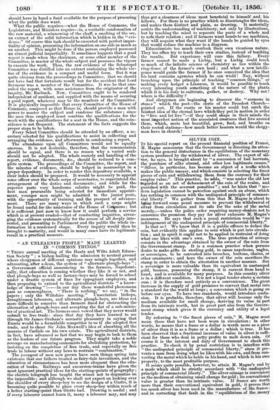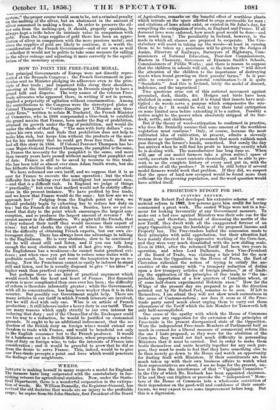SILVER COIN.
IN his special report on the present financial position of. France, M. Magne announces that the Government is directing its atten- tion to the general disturbance in the equilibrium of the monetary system produced by the withdrawal of silver. The export of sil-
, • he says, is brought about by "a succession of- bad harvests,
the purchase of silks abroad, and other less legitiniate causes." "Silver, in particular, has become an object of a traffic which makes the public uneasy, and which consists in selecting the finest pieces of coin and withdrawing them from the currency for their surplus value." This practice, he adds, " was under the old law 'regarded as an act of debasement of the coin of the realm, and punished with the severest penalties" ; and he hints that "mo- dern legislation cannot be powerless against such an abuse, which has nothing in common with the undisputed principle of commer- cial liberty." We gather from this that M. Maple is about to lmiug forward some penal measure to prevent the withdrawal of silver from circulation and its sale for the sake of the metal merely,—unless the police order requiring money-dealers not to announce the premium they pay for silver exhausts M. Magne's measures. He says that such a penal restriction would be "no infringement of the undisputed principle of commercial liberty."
Is that so We know that it is a public offence to deface the
coin, but evidently this applies to coin which is put into circula- tion ; and in spirit it ought not to be applied in restraint of doing what one likes with one's own. The true protection of coinage consists in the advantage obtained by the owner of the coin from the Government stamp. It is a common practice when persons desire to make gifts in steie;tliz gold, to cause napoleons, eagles, or sovereigns, to be cony into brooches, buttons, chains, or other ornaments ; and here the owner of tbe- coin sacrifices the stamp in order to obtain the attestation in another manner. But a sovereign is more valuable than its e9.uivalent in unstamped gold, because, possessing the stamp, it is current from hand to hand, and is available for many purposes. In this country silver is in a different condition. It is not a legal tender above a certain sum ; it is therefore used entirely as a convenience. The great increase in the supply of gold promises to convert that metal into a standard for the world at large • a conversion which is going on before our eyes. To have two standards, would introduce confu- sion. It is probable, therefore, that silver will become only the medium available for small change, deriving its value in part from its intrinsic worth, but in great part also from the Govern- ment stamp which gives it the currency and utility of a legal tender.
By referring to " the finest pieces of coin," M. Magee must mean those that have not been worn in circulation ; in other words, he means that a franc or a dollar is worth more as a piece of silver than it is as a franc or a dollar ; which is true. It has been observed that a fractional increase of value in silver is suffi- cient for those who deal in petty profits to melt down coin. Of course it is the interest and duty of Government to check this practice. To check it by penal restriction is to interfere with "the undisputed principle of commercial liberty," since it pre- vents a man from doing what he likes with his own, and from con- verting the metal which he holds in his hand, and which is his own property, to the most profitable purpose.
It seems quite possible, however, to attain M. Magne's end by
a mode which shall be strictly accordant with " the undisputed principle of commercial liberty." The silver coinage is convenient as the medium of obtaining small change for gold ; its conventional value is greater than its intrinsic value. If francs are worth more than their conventional equivalent in gold, it proves that too much silver has been used in the manufacture of the francs ; and in correcting that fault in the " equilibrium of the money system," the proper course would seem to be, not a criminal penalty on the melting of the silver, but an abatement in the amount of silver consumed in making a franc. In order to preserve the sil- ver coin from the melting-pot, it should, properly speaking, be always kept a trifle below its intrinsic value in comparison with gold. From the large supplies of gold there has been an. appre- ciation of silver in comparison with the more precious metal; and since the supplies of gold are likely to continue, it is worth the consideration of the French Government—and of our own as well —whether it would not be politic to take some measure for calling in the silver coinage and adjusting it more correctly to the equili- brium of the monetary system.



























 Previous page
Previous page